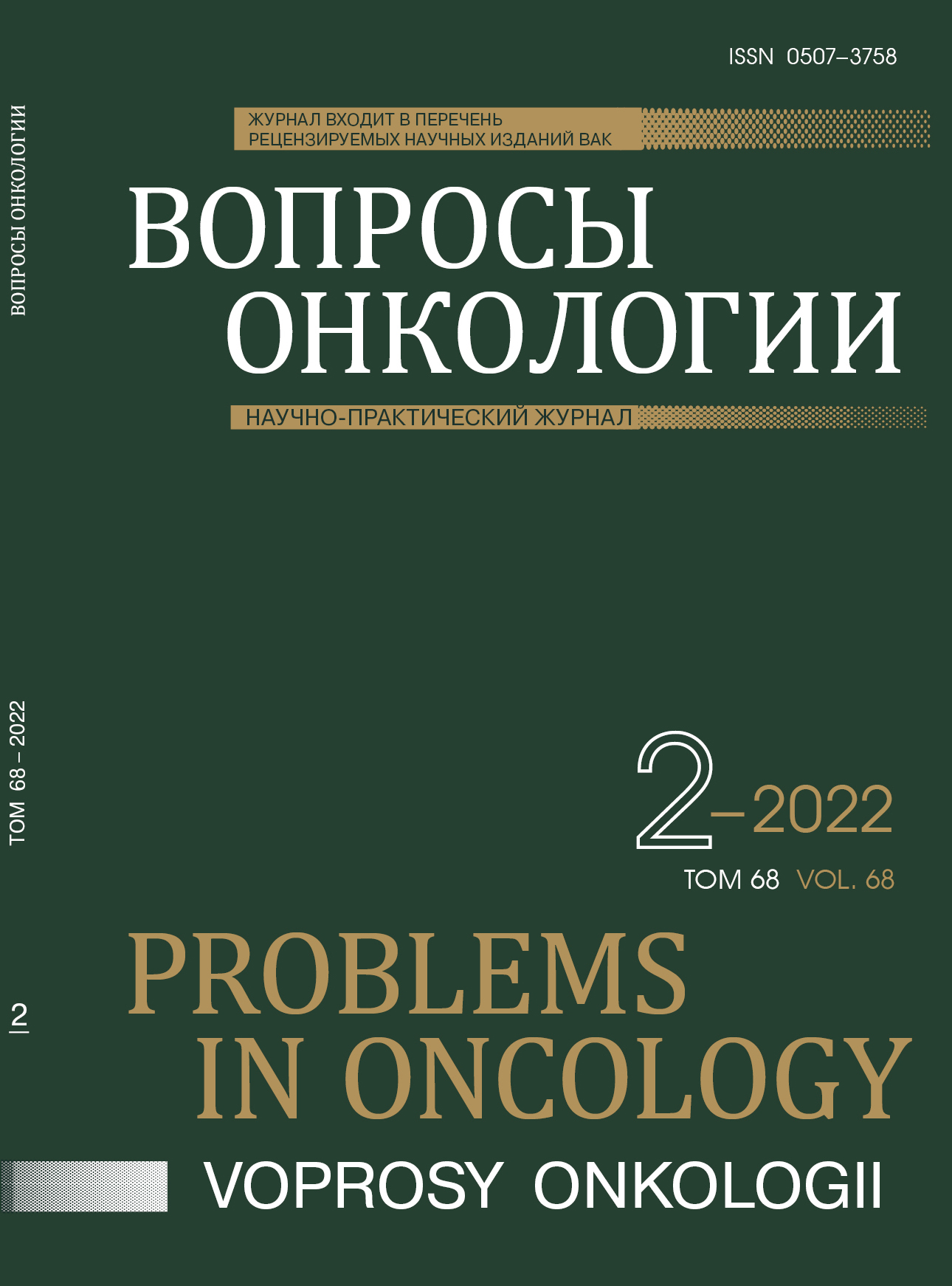Abstract
Background. PD-1 and PD-L1 immune checkpoint inhibitors (ICI) show efficacy in many tumor types, and the indications for their use continue to expand. Meanwhile, treatment with ICI is often accompanied by specific immune-related adverse events (irAEs). The real-world data of the incidence of irAEs in Russian patients is lacking.
Objectives. The study aimed to characterize the frequency and profile of irAEs registered in Russian patients.
Materials and methods. The retrospective study included patients with various solid malignancies who received immunotherapy in N.N. Petrov National Research Institute of Oncology or other oncological institutions of St. Petersburg during 2018–2021. The following treatment regimens were used: monotherapy with anti-PD-1 monoclonal antibody (nivolumab, pembrolizumab or prolgolimab), anti-PD-L1 monoclonal antibody (atezolizumab) or combination therapy with anti-PD-1 and anti-CTLA-4 antibodies (nivolumab and ipilimumab). The frequency and spectrum of irAEs were evaluated depending on the treatment regimen.
Results. Any-grade irAEs were registered in 58 out of 178 (32.6%) analyzed patients. The most common adverse events were liver toxicity (11.2%) and thyroid dysfunction (10.1%). Severe irAEs (≥3 grade) occurred in 15.7% of cases. There was one fatal outcome due to grade 5 immune-mediated hepatitis. Combined immunotherapy was associated with a higher frequency of immune-related toxicity compared to monotherapy anti-PD-1/PD-L1 monoclonal antibodies (70.6% vs 23.6%, respectively, p<0.0001).
Conclusions. The reported frequency of adverse events of PD-1 and PD-L1 inhibitors in Russian patients was lower than in the majority of the foreign studies.
References
Connolly C, Bambhania K, Naidoo J. Immune-Related Adverse Events: A Case-Based Approach // Front Oncol. 2019;9:530. doi:10.3389/fonc.2019.00530
Karimian Z, Mavoungou S, Salem JE et al. The quality of reporting general safety parameters and immune-related adverse events in clinical trials of FDA-approved immune checkpoint inhibitors // BMC Cancer. 2020;20(1):1128. doi:10.1186/s12885-020-07518-5
Mok TSK, Wu YL, Kudaba I et al. Pembrolizumab versus chemotherapy for previously untreated, PD-L1-expressing, locally advanced or metastatic non-small-cell lung cancer (KEYNOTE-042): a randomised, open-label, controlled, phase 3 trial // Lancet. 2019;393(10183):1819–1830. doi:10.1016/S0140-6736(18)32409-7
André T, Shiu KK, Kim TW et al. Pembrolizumab in Microsatellite-Instability-High Advanced Colorectal Cancer // N Engl J Med. 2020;383(23):2207–2218. doi:10.1056/NEJMoa2017699
Sharma P, Retz M, Siefker-Radtke A et al. Nivolumab in metastatic urothelial carcinoma after platinum therapy (CheckMate 275): a multycentre, single-arm, phase 2 trial // Lancet Oncol. 2017;18(3):312–322. doi:10.1016/S1470-2045(17)30065-7
Brahmer J, Reckamp KL, Baas P et al. Nivolumab versus Docetaxel in Advanced Squamous-Cell Non-Small-Cell Lung Cancer // N Engl J Med. 2015;373(2):123–35. doi:10.1056/NEJMoa1504627
Yau T, Kang YK, Kim TY et al. Efficacy and Safety of Nivolumab Plus Ipilimumab in Patients With Advanced Hepatocellular Carcinoma Previously Treated With Sorafenib: The CheckMate 040 Randomized Clinical Trial // JAMA Oncol. 2020;6(11):e204564. doi:10.1001/jamaoncol.2020.4564
Hellmann MD, Paz-Ares L, Bernabe Caro R et al. Nivolumab plus Ipilimumab in Advanced Non-Small-Cell Lung Cancer // N Engl J Med. 2019;381(21):2020–2031. doi:10.1056/NEJMoa1910231
Herbst RS, Giaccone G, de Marinis F et al. Atezolizumab for First-Line Treatment of PD-L1-Selected Patients with NSCLC // N Engl J Med. 2020;383(14):1328–1339. doi:10.1056/NEJMoa1917346
Antonia SJ, Villegas A, Daniel D et al. Durvalumab after Chemoradiotherapy in Stage III Non-Small-Cell Lung Cancer // N Engl J Med. 2017;377(20):1919–1929. doi:10.1056/NEJMoa1709937
D'Angelo SP, Bhatia S, Brohl AS et al. Avelumab in patients with previously treated metastatic Merkel cell carcinoma: long-term data and biomarker analyses from the single-arm phase 2 JAVELIN Merkel 200 trial // J Immunother Cancer. 2020;8(1):e000674. doi:10.1136/jitc-2020-000674
Powles T, Park SH, Voog E et al. Avelumab Maintenance Therapy for Advanced or Metastatic Urothelial Carcinoma // N Engl J Med. 2020;383(13):1218–1230. doi:10.1056/NEJMoa2002788
Villadolid J, Amin A. Immune checkpoint inhibitors in clinical practice: update on management of immune-related toxicities // Transl Lung Cancer Res. 2015;4(5):560–75. doi:10.3978/j.issn.2218-6751.2015.06.06
Kumar V, Chaudhary N, Garg M et al. Current Diagnosis and Management of Immune Related Adverse Events (irAEs) Induced by Immune Checkpoint Inhibitor Therapy // Front Pharmacol. 2017;8:49. doi:10.3389/fphar.2017.00049
Belum VR, Benhuri B, Postow MA et al. Characterisation and management of dermatologic adverse events to agents targeting the PD-1 receptor // Eur J Cancer. 2016;60:12–25. doi:10.1016/j.ejca.2016.02.010
Almutairi AR, McBride A, Slack M et al. Potential Immune-Related Adverse Events Associated With Monotherapy and Combination Therapy of Ipilimumab, Nivolumab, and Pembrolizumab for Advanced Melanoma: A Systematic Review and Meta-Analysis // Front Oncol. 2020;10:91. doi:10.3389/fonc.2020.00091
Patel AB, Pacha O. Skin Reactions to Immune Checkpoint Inhibitors // Adv Exp Med Biol. 2018;995:117–129. doi:10.1007/978-3-030-02505-2_5
Som A, Mandaliya R, Alsaadi D et al. Immune checkpoint inhibitor-induced colitis: A comprehensive review // World J Clin Cases. 2019;7(4):405–418. doi:10.12998/wjcc.v7.i4.405
Wolchok JD, Chiarion-Sileni V, Gonzalez R et al. Overall Survival with Combined Nivolumab and Ipilimumab in Advanced Melanoma // N Engl J Med. 2017;377(14):1345–1356. doi:10.1056/NEJMoa1709684
Malnick SDH, Abdullah A, Neuman MG. Checkpoint Inhibitors and Hepatotoxicity // Biomedicines. 2021;9(2):101. doi:10.3390/biomedicines9020101
Grover S, Rahma OE, Hashemi N, Lim RM. Gastrointestinal and Hepatic Toxicities of Checkpoint Inhibitors: Algorithms for Management // Am Soc Clin Oncol Educ Book. 2018;38:13–19. doi:10.1200/EDBK_100013
Chang LS, Barroso-Sousa R, Tolaney SM et al. Endocrine Toxicity of Cancer Immunotherapy Targeting Immune Checkpoints // Endocr Rev. 2019;40(1):17–65. doi:10.1210/er.2018-00006
Barroso-Sousa R, Barry WT, Garrido-Castro AC et al. Incidence of Endocrine Dysfunction Following the Use of Different Immune Checkpoint Inhibitor Regimens: A Systematic Review and Meta-analysis // JAMA Oncol. 2018;4(2):173–182. doi:10.1001/jamaoncol.2017.3064
de Filette J, Andreescu CE, Cools F et al. A Systematic Review and Meta-Analysis of Endocrine-Related Adverse Events Associated with Immune Checkpoint Inhibitors // Horm Metab Res. 2019;51(3):145–156. doi:10.1055/a-0843-3366
Wang DY, Salem JE, Cohen JV et al. Fatal toxic effects associated with immune checkpoint inhibitors: a systematic review and meta-analysis // JAMA Oncol. 2018;4(12):1721–1728. doi:10.1001/jamaoncol.2018.3923
Nishino M, Giobbie-Hurder A, Hatabu H et al. Incidence of Programmed Cell Death 1 Inhibitor-Related Pneumonitis in Patients With Advanced Cancer: A Systematic Review and Meta-analysis // JAMA Oncol. 2016;2(12):1607–1616. doi:10.1001/jamaoncol.2016.2453
Khunger M, Rakshit S, Pasupuleti V et al. Incidence of Pneumonitis With Use of Programmed Death 1 and Programmed Death-Ligand 1 Inhibitors in Non-Small Cell Lung Cancer: A Systematic Review and Meta-Analysis of Trials // Chest. 2017;152(2):271–281. doi:10.1016/j.chest.2017.04.177

This work is licensed under a Creative Commons Attribution-NonCommercial-NoDerivatives 4.0 International License.
© АННМО «Вопросы онкологии», Copyright (c) 2022
